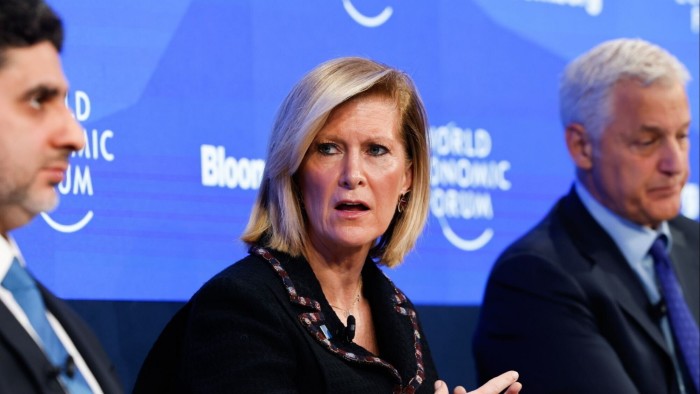Unlock the White House Watch newsletter for free
Your guide to what the 2024 US election means for Washington and the world
US banks are “in the beginning of go-mode” and “animal spirits are alive”, according to a senior JPMorgan Chase executive, as Wall Street bets that a lighter-touch regulatory regime under President Donald Trump will spur dealmaking in the world’s largest economy.
Speaking at the World Economic Forum in Davos on Tuesday, Mary Erdoes, asset and wealth management chief at the Wall Street lender, said it was “hopeful” that Trump’s regulatory approach would boost the US economy, undoing some of the burden placed on the banking industry by Joe Biden’s administration.
“If you look at the last administration and the number of new, significant regulations, it was eight times the number of significant new regulations versus the prior Trump administration,” said Erdoes, who is seen as a contender to succeed Jamie Dimon at JPMorgan.
“With that comes multiple millions of man hours of paperwork. Work . . . that clogs up the system and stops the economy from continuing to have that very healthy flywheel. So we’re really looking forward to that.”
Erdoes’ comments come as banking executives in Europe are concerned that the lighter-touch regulatory approach favoured by Trump could put European banks at a competitive disadvantage if regulators on the continent demand a more stringent application of rules such as Basel 3.1.
Speaking at the same panel on Tuesday, Standard Chartered chief executive Bill Winters said it was important that rules were “set consistently globally, so that we don’t have this arbitrage from market to market”.
While Europe might find it difficult to row back on certain regulations, the UK could lean heavily towards the US system, according to one senior banking executive.
“The UK government will be at the forefront of deregulation,” the executive said. “They have delayed the implementation of Basel III to see how or if it is implemented in the US.”
Meanwhile, JPMorgan’s Erdoes said that lighter regulation in the US could result in more dealmaking and companies going public. “Companies don’t want to go public or can’t go public because of the heavy regulatory burden and hopefully you’ll see that [change],” she said.
She added that JPMorgan had set up a “war room” to analyse and evaluate Trump’s executive orders overnight and praised the US president’s decision to ban remote working for federal employees. This month, JPMorgan said it would require all staff to return to the office five days a week from March.
“Time will tell but a lot of this is exactly what you would do to have a very pro-business environment,” Erdoes said. “Thank God the US government has done it, and hopefully that’ll keep us ahead of other governments in the world so we can continue to compete.”



